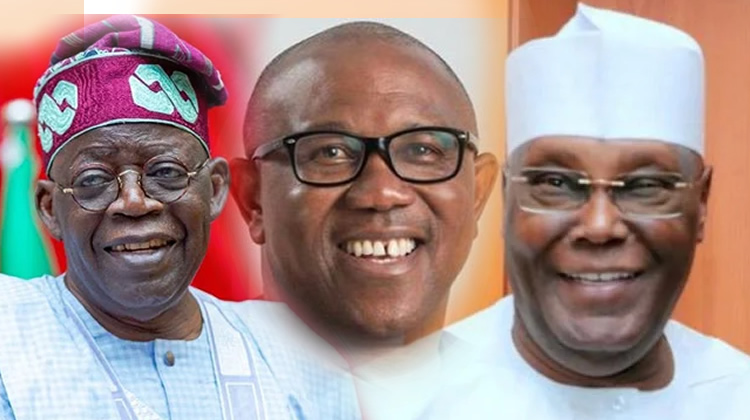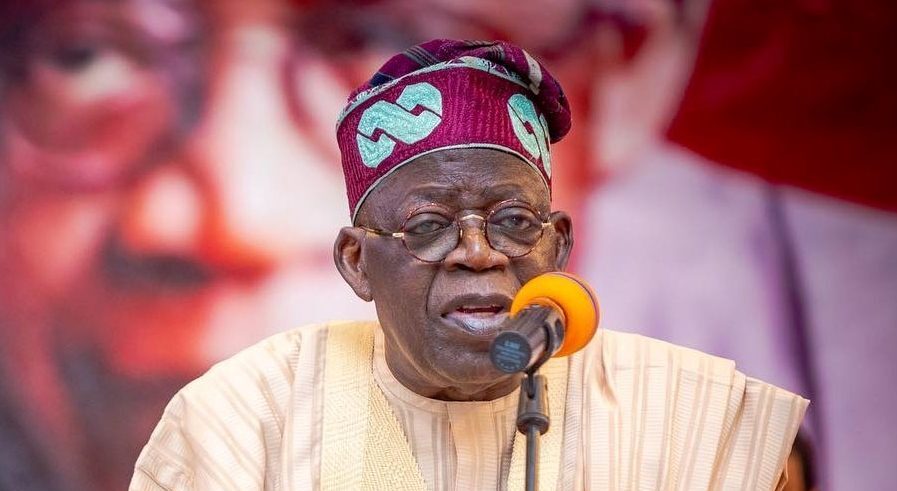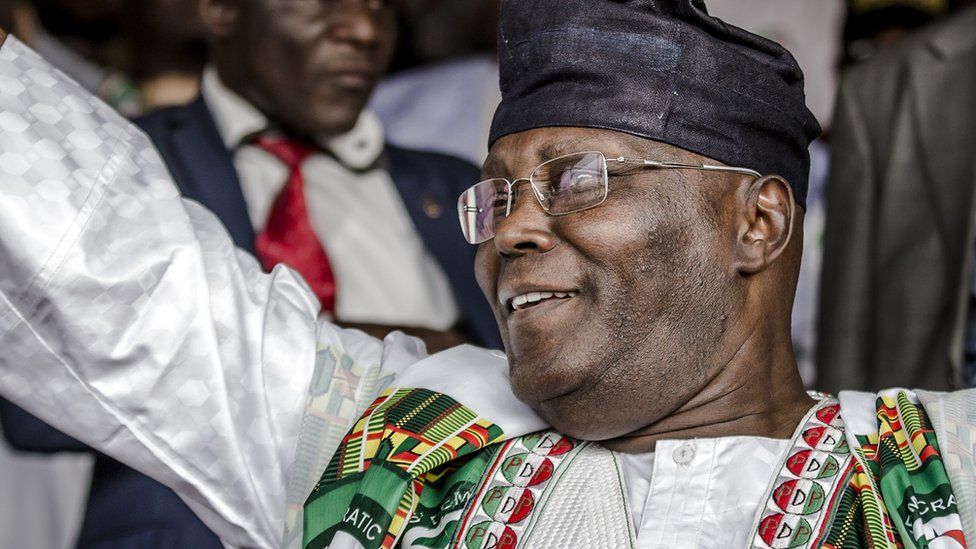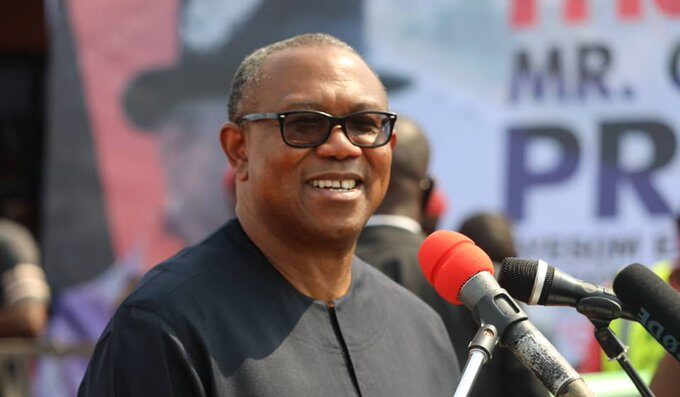AFRICA THOUGHT
– News features, commentaries, analyses, interviews & Op-ed.
ANALYSIS: Who Will Replace Buhari As President When Nigerians Go To The polls Next Month?
Asks Caleb Onyeabor/Analysis Exclusive to The African Times/USA

Next month’s presidential election in Nigeria is likely to mark a defining moment in the political history of Africa’s most populous nation. This 2023 Presidential elections in Nigeria is going to be a lot different in many years since the fourth republic began. As it were in the first and second republic, this is the first time in the fourth republic that the three major candidates in the elections are from the three major ethnic groups in the country. In 2015, Nigeria witnessed the rise of a formidable second force to challenge the dominance of the then ruling party. This 2023, a third force has emerged making the race a three horse race and creating more speculations and permutations in the mathematics for election victory.
The pathway to victory for any of the major candidates is subject to the addition and subtraction of shifting variables. Since there will be no incumbent on the ballot and no visible desperate attempt by the current President to install a successor as was done in 2007, the chances of the candidates are even more open. The question then is who will the 2023 Presidential elections? What are the facts on ground? What is the science of politics saying? Let’s take a glossary look at the major candidates, their strengths, weaknesses and pathway to victory.

BOLA AHMED TINUBU (APC):
A former Governor of the prosperous State of Lagos, Tinubu has the prime advantage of being the candidate of the ruling party that has had dominance over the national political landscape in the last seven-and-half years. He is considered a political strongman with a formidable network of proteges within the politically volatile South Western region of the country, plus a touch of following from up North. His credential as one of the leaders of the opposition since 1999 given the instrumental role he played in the formation of the current APC and the attendant election of the current President, forms one of his major political capitals.
Tinubu is known as a well-known political gladiator. In his party’s primaries, he weathered a seeming conspiracy from the top leadership and shook off a panoply of equally strong contenders to clinch the right to become the eventual flag bearer. With a vast yet controversial source of enormous personal wealth, and lots of ‘help’ from the resources of the state treasuries controlled by the APC, Tinubu is obviously the man to beat in the upcoming elections. In an election that promises to be highly monetized, Tinubu has the upper hand.
His strongest campaign advantage is the vain-glorious reference to his so-called achievements as the Governor of Lagos State. Part of his rhetoric is his ‘promise’ to replicate the ‘Lagos experience’ at the national level. While he appears to have a firm grip of the electorate in the southwest region from where he hails, his pathway to victory will depend largely on the support from the leaders of Northern extraction in the Hausa/Fulani demography of his party, and if they will keep their promise to him. If the en-bloc support which the North offered him at the party primaries is repeated, it is not unlikely that Tinubu will prevail at the polls come February.
His decision to pick a Muslim running mate could however portend trouble for him or could on another hand also be a source of strength. As strength, his controversial decision has most definitely appeased the Muslim North who ordinarily see a Muslim as President and another Muslim as Vice President a boon. On the weakness column, his risqué decision to go against the grain of the overall national consciousness in choosing a running mate will in turn serve as a turnoff for the beleaguered Northern Christians and people of similar faith both in the southeastern and southwestern regions of the country. The projection is that they are more likely to cast protest votes against him in the upcoming elections.
Physically, Tinubu is visibly frail and this has been a major campaign argument by his opponents who see him as medically unfit to occupy the highest office in the land. His critics believe that Tinubu’s vaulting ambition to be the President of the Federal Republic of Nigeria is a selfish desire on the part of one man hellbent on ruling Nigeria by any means necessary. His incessant public gaffes and incoherence of speech have made him a butt of jokes both in the public and in the private. However, our analysis indicates that his health condition might not necessarily affect his march to the presidential suite.
Tinubu’s role in the APC, a party with a worsted image as a result of Buhari’s calamitous turn of economic and political programs that has led to mass youth restiveness and discontent.. Our calculations therefore show that he is unlikely to win any of the states in the south-south or in the southeast. And If our indices serve us right, Tinubu may have to settle for at least 25% of the national votes from these two regions, and will invariably serve him well to funnel his party’s political capital into consolidating the southwest and the Northern States especially the Northeast and Northwest regions where his party has a strong following. With the backing of 21 APC State Governors out of the 36 of them, Tinubu obviously has the advantage in the overall equation, as long as he is not betrayed at the end from within the inside of his party.

ATIKU ABUBAKAR (PDP):
Atiku Abubakar, Nigeria’s one-time Vice President is often referred in political circles as a veteran of presidential elections having contested for the lofty position since 1993. Political pundits believe that his chances of achieving his almost 30-year ambition could rise and fall based on different determinants. They believe that his chances from the get-go have been narrowed by series of events from the moment that he won the primaries of his party, the PDP.
Firstly, the decamping of his erstwhile running mate in the 2019 election threatens the success of the PDP in the southeast and south-south zones, two regions that have been the party’s traditional base since 1999. Secondly, a fallout between the top leadership of his party and the petulant but influential Governor of the oil-rich Rivers State, Nyesom Wike has created a wide gulf within the party that threatens Atiku’s chances. On Wike’s side are four other governors, who are insisting on the resignation of the party chairman in favor of a southerner. Atiku’s PDP is enmeshed in a zoning palaver. Wike and his Gang of 5 are also questioning the fairness in having a Northerner replace another Northerner after eight years and argue that it should be the turn of the South to produce the new president.
However, Atiku’s best argument is in reminding the electorate how well they fared under the administration of President Olusegun Obasanjo when he superintended the government’s economic growth plan. Additionally, he has been able to capitalize on his formidable network of friends and political associates in the different parts of the country including the south. By all standards, his election manifesto remains the best and the most pragmatic. He is equally and arguably the candidate with a better national spread than his opponents. The calculation shows that his masterplan to clinch victory is to win in a couple of states in the South, a traditional PDP enclave, and then count on a monumental support from the North which is the traditional base of this ’son-of-the-soil’. Some of us have a sneaky feeling that Atiku might be counting on his Northern compatriots to stab Tinubu in the back. In politics as in war, all is fair. Add this dynamic to the pieces of building blocks – the picking up of a good chunk of the votes in the Southern part of the country. With this permutation, Atiku Abubakar could win the elections.
Even with the rise of Peter Obi in the southeast, Atiku is still likely to clinch some states in the southeast region from where Obi hails. This, some persons of influence in the region reveal, is based on a rumored ‘gentleman’s agreement’ between him and leaders in the region which will guarantee his support for a person of southeastern origin as his successor. Equally of significance and worthy of verification, is the ‘rumor’ that Atiku also appears to have the tacit support of some ‘power brokers’ in the current presidential villa in Abuja. If true, could boost his chances. His pathway to victory is to clinch a few states in the South which look likely because of a historical PDP base which doesn’t look like will be easily dismantled by the movement for the Labour party candidate and a monumental support from the North where he hails from. Should the northern governors and northern leaders stab the candidate of the APC at the back, Atiku is the likely beneficiary of the massive northern bloc votes. With massive Northern support and the few pieces of states he might pick in the south, Atiku has a chance. Unlike the other two major candidates, Atiku has a national outlook. The candidate of the PDP is the only candidate who might win at least a state in the North East, North West, South South, South East, North Central and could pull a surprise in one of the South Western states. However, the kind of votes he needs to win will be determined by where the massive votes of the North go.

PETER OBI ( LABOR PARTY):
This gentleman remains the ‘wild card’ in this election. So far, Peter Obi has done well for himself in terms of building a political base basically from nothing. He is the first major presidential candidate from the southeast since Dr. Nnamdi Azikiwe in 1983, and has been shifting the wave of a credible alternative away from the siamese twins of the PDP and APC – a ship of which he was once a a co-pilot. An account of his stewardship as the Governor of Anambra state has majorly endeared him to a vast majority of Nigerian youths and conversely pitted him against the status quo.
Based on our projections, Obi has however the least chance of victory in the face of lack of a viable political structure necessary to win such a contentious election. The result of this is that while he enjoys support of urban dwellers and the social media savvy crowd manifesting offline on the streets of urban centers, there is a relatively low spread in rural and very rural areas for Peter Obi. His popularity is spread around urban areas of southern audiences, and has little to show across the Niger River divide, especially in the rural areas of core Northern States. His party, the Labour Party has proven to be pretty much unsophisticated and lacks the battle-readiness needed to win this election. Aside the moral victory that he has won hands down nationally and across ethnic lines, Obi’s strategy loses traction when juxtaposed against the many other variables. His best bet to vote-catching will be his appeal to the predominantly Christian communities and youth population across the country. Whether that is enough to ensure victory at the polls remains to be seen.
Having said that, there is no denying that Obi’s entrance into the fray has dramatically changed Nigeria’s polity. Within six months, Obi’s mission has been able to shift from being impossible to probably possible – a victory which if it ever happens will be a political miracle of our time. His best chances to victory even in his native southeastern part of the country is grossly stymied by his party’s weak machinery and obvious immaturity. His strongest suit however is the mass support from mostly youths of the country.
Obi, no doubt has caused a disruption in the country’s politics as his candidacy has undoubtedly sparked a level of political awareness and consciousness that saw voters registration numbers increase by a staggering 12 million prospective voters.
Pundits believe that not even the well-publicized endorsement from former President Obasanjo can turn things around for Obi. Lately, many Nigerians have began to question the electoral value and political relevance of the former President who seems to have lost his political mojo both as an influencer and a kingmaker. To bolster his chances, Obi will need something as significant as a wholesale block vote of the so-called G5 cadre led by Nyesom Wike to win. Yes, Obi needs the strong and complete support of the G5 governors to boost his chances in the South. In a unfortunate highly monetized political space, Obi and his Labour party will be the least spender in the elections. Another reason why he is likely to end up behind the first two. Obi’s pathway to victory will include a landslide in the South East and South South states, a fair outing in the South West and a surprise victory in one or two states in the North. Though this looks very unlikely when you consider the facts on ground, however, there is still room for miracles in politics. If his army of young persons can make an unprecedented outing in the coming elections and organize themselves into a formidable structure that can rival and defeat the deep rooted and organized structure that the two dominant parties boast of, Obi’s chances will be surer than not.
DETERMINANTS OF THE 2023 ELECTIONS:
In most elections the determinants for victory at the polls, include the power of incumbency, viable power structures, and a network of loyal associates. In the Nigerian political context and with the February presidential election in focus, the State Governors are likely to hold the ace in determining who succeeds Buhari as the President of the Federal Republic of Nigeria. Whichever candidates enjoys the support of the highest numbers of state governors in control of their state structures will emerge victorious. The position of the North is another determinant. Since 2003, the north has always given their bloc votes to one of their own. With the exception of the 1993 elections, the core north is not known for voting for another non-northern candidate. This is why Buhari has repeatedly gotten 12 million bloc votes. The position of the North can see another candidate inheriting that bloc vote. Should the Northern governors and her allies stick to Tinubu, the APC candidate will win but if there is a last minute stunner where the North votes her own, Atiku will emerge. In between, a split of the northern votes for Atiku and Tinubu can make Obi chances go higher.
Nigeria’s poverty rate is going to another major determinant of the election. With 133 million persons under multi-dimensional poverty, vote buying and selling is going to be historic. Thus, the elections are going to be a contest of the highest bidder. Although the elections doesn’t look like it is going to be transparent, if by chance the Buhari administration keeps their word of ensuring a free, fair and credible elections, the odds will only favor the party with the strongest, widest and most active strongholds in the country.
Lastly, the massive support and the awakening of Nigeria’s teeming youths has the potential to alter the arithmetical equation in the upcoming Nigerian presidential election. “The level of the determination and organization that these young persons can put up during the elections will go a long way. How they organize themselves into a formidable political machinery and structure to rival what is already on ground can determine whether we will see a political miracle or not”.
All in all, the coming elections promises to be one of the most interesting in the country’s recent history. The buildup to the elections itself has been intriguingly theatric. While either Tinubu or Atiku remain the odds-on-favorite to win the election, Peter Obi has done well not to be underestimated.
The elections are not a make or break situation. Whoever wins, Nigeria will go on.
Newsletter
Subscribe to our bi-weekly newsletter and be the first to Receive New Updates.
The ‘Black People Read’ campaign has been launched. An initiative by The African Times/USA, it is designed to promote and sustain the reading culture among Black people around the world.
In times past, it was often derisively said that if you want to hide something from a Black person or any person of color, put it inside a book.
Your comments, ideas, and thoughts matter.
Drop us a line:
